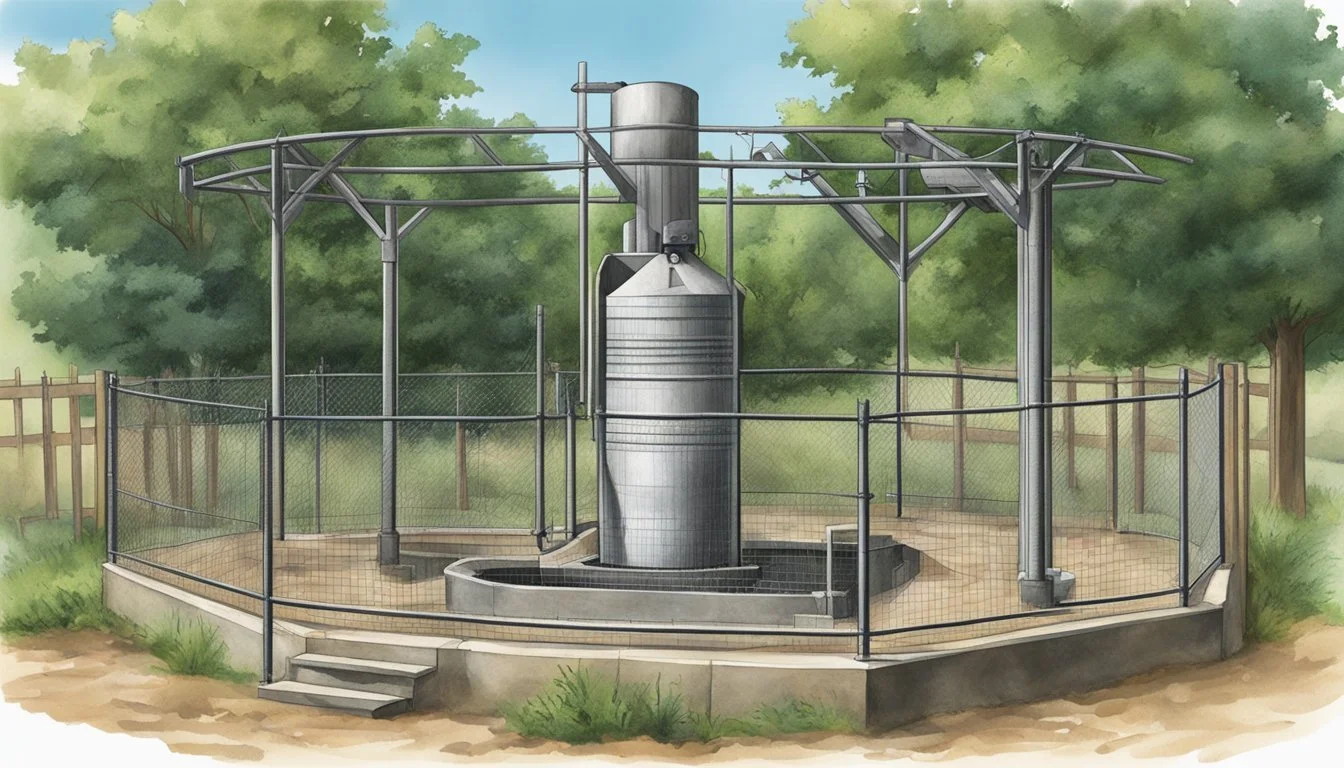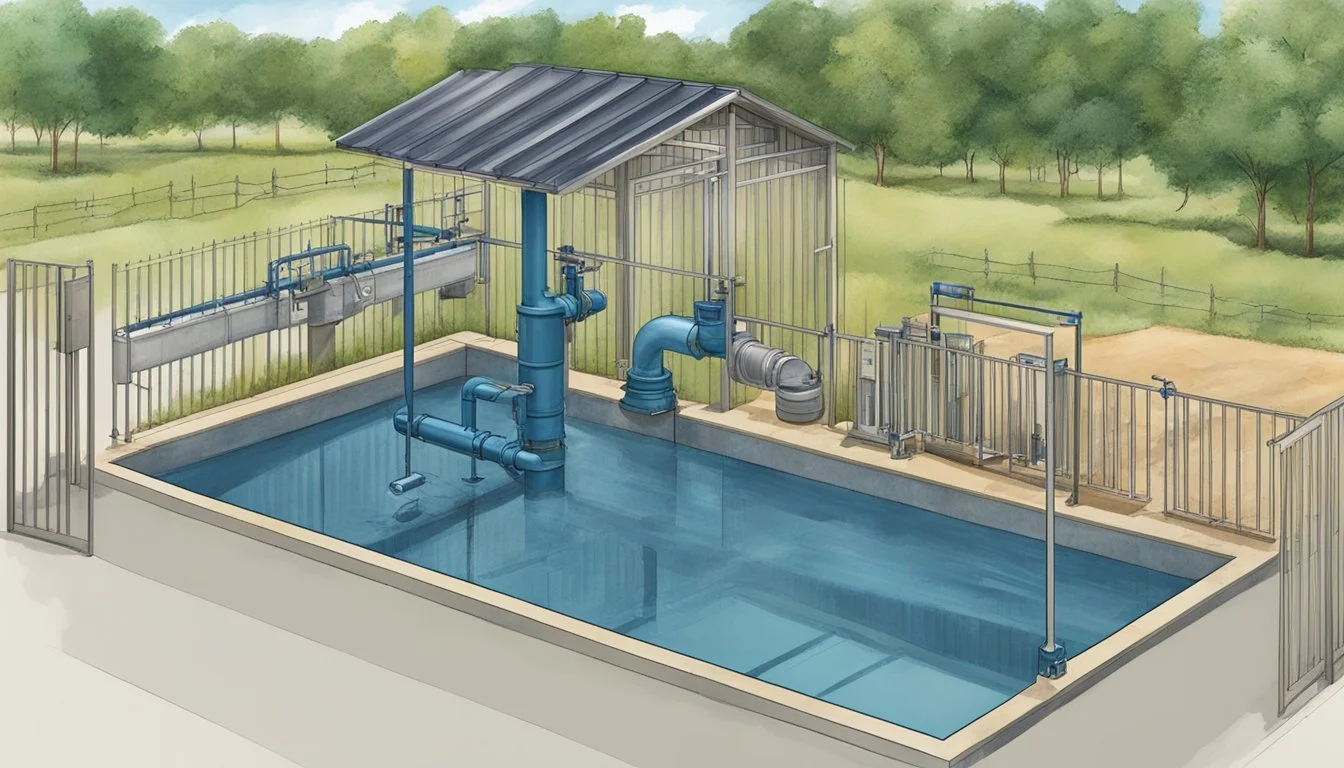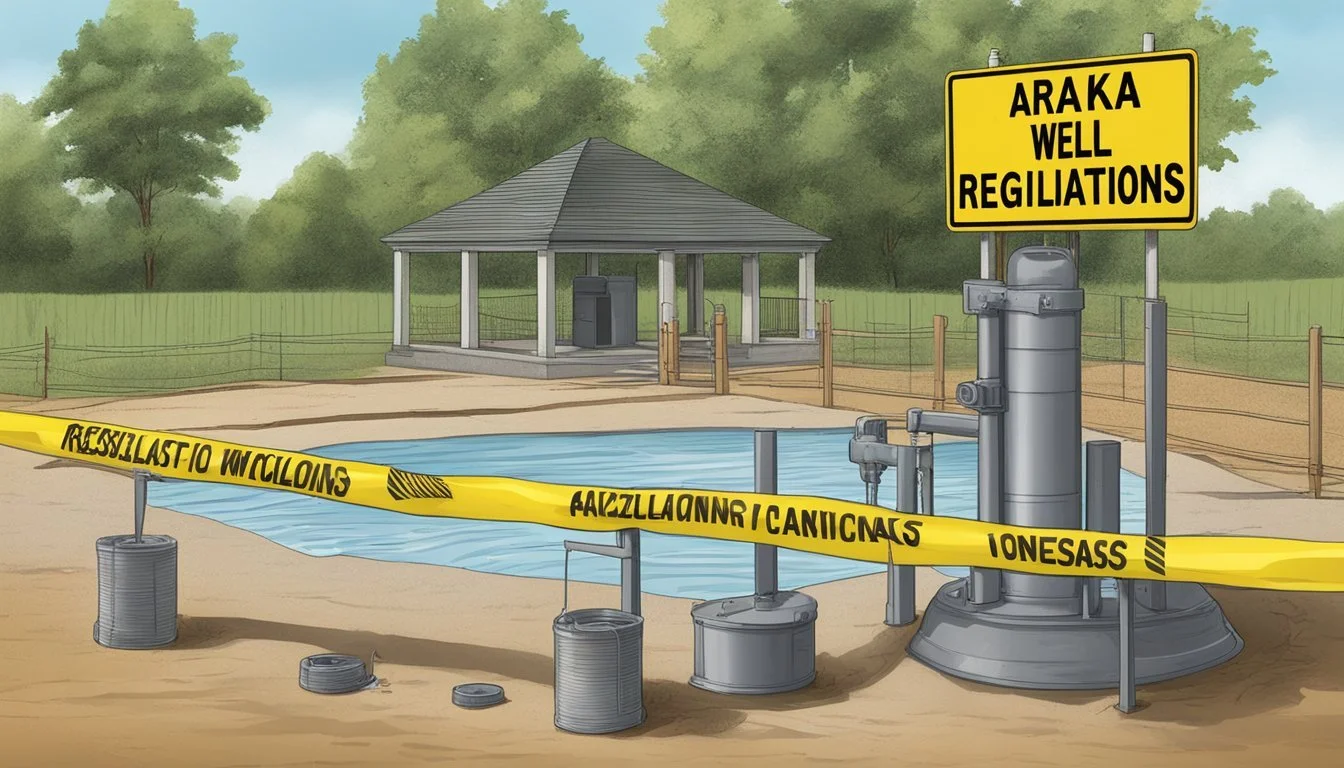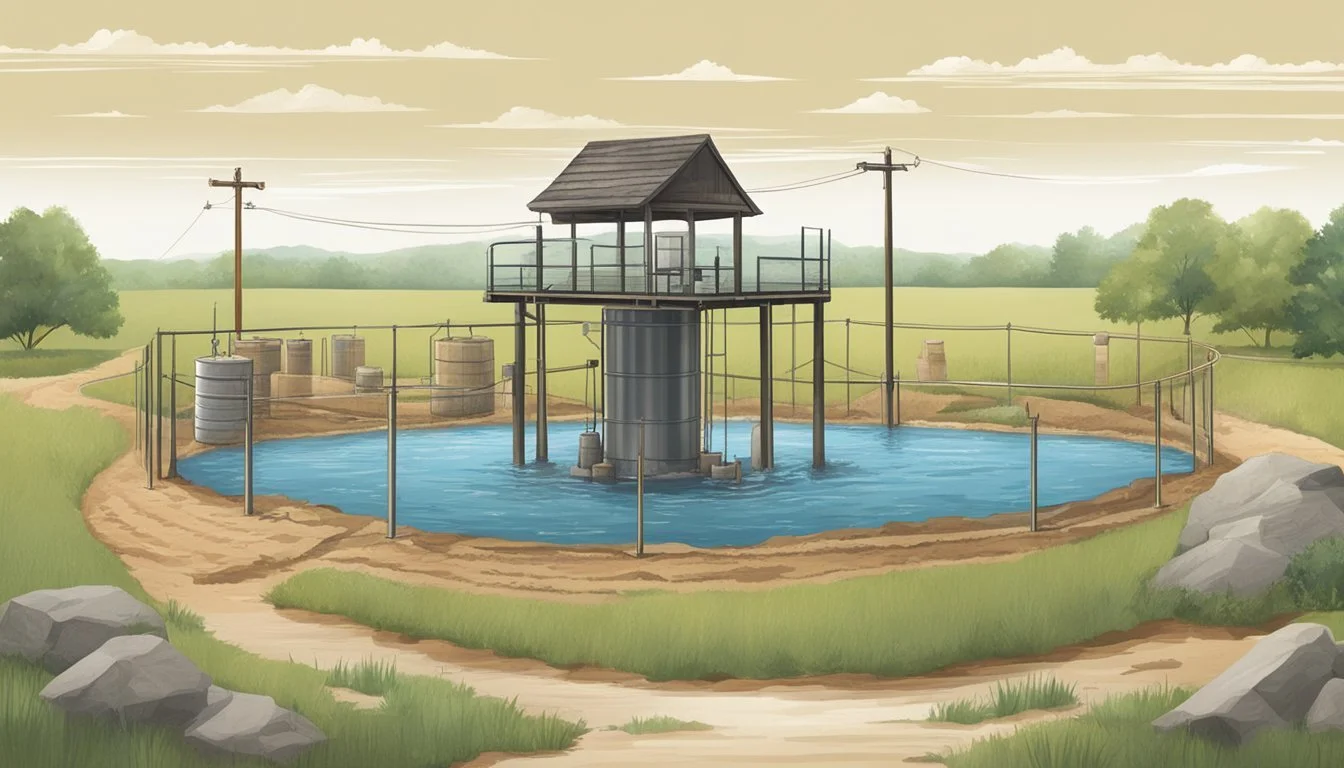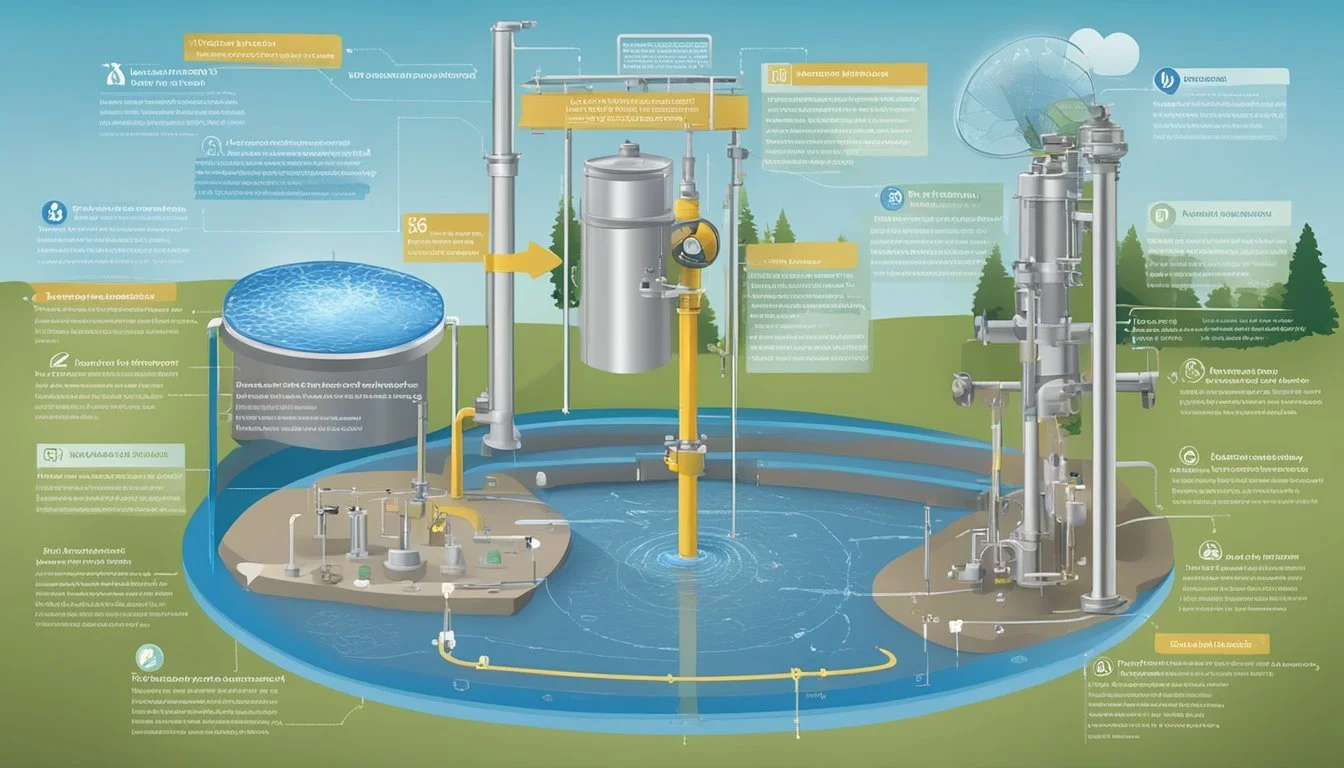Arkansas Water Well Regulations
Understanding Legal Compliance for Drillers
Water wells are vital to the infrastructure and public health of Arkansas, providing essential water resources for both residential and agricultural needs. The state maintains rigorous regulations to safeguard the integrity of water well construction and the protection of groundwater, ensuring that water supply remains safe, clean, and reliable for its citizens. These regulations are laid out by authoritative bodies and aim to establish a standard that all water well construction must meet in light of environmental, safety, and health concerns.
The Arkansas Water Well Construction Commission (AWWCC) was established to oversee the enforcement of these regulations, which cover every aspect of water well construction, from the location and design to construction, maintenance, and abandonment. By enforcing such standards, the commission plays a critical role in preventing water contamination and preserving water resources for future generations. They have also set protocols for routine inspections and defined the consequences of non-compliance, ensuring that water well contractors operate within the legal framework.
Understanding the intricacies of Arkansas Water Well Construction regulations is crucial for contractors, property owners, and policymakers. It not only helps protect one of the state's most precious natural resources but also aligns with the public interest in maintaining health and safety standards. Adherence to these rules showcases a commitment to responsible stewardship of the environment and upholds the quality of life for all Arkansans.
Overview of Arkansas Water Well Regulations
In Arkansas, the governance of water well construction is spearheaded by the Arkansas Water Well Construction Commission. This regulatory body is empowered with enforcing standards and practices that safeguard public health and natural resources.
The commission's responsibilities include:
Issuing Licenses: Contractors must obtain proper licensing to construct or repair wells.
Inspections: Routine inspections ensure wells meet sediment control protocols.
Setting Standards: Regulations outline minimum requirements for well construction, location, and repair.
The Arkansas Water Well Construction Commission Rules (updated 2020) provides comprehensive guidelines that contractors must adhere to. These rules are established to prevent contamination and to manage aquifers sustainably.
Regulations cover various components of water well construction such as:
Site selection and preparation
Design and construction materials
Drilling methods
Surface seal requirements to prevent contamination
The Arkansas Department of Agriculture oversees the management of water resources, working in conjunction with the commission to address concerns related to the water supply and integrity of construction practices.
Contractors operating in Arkansas must comply with the rules set by the commission. By maintaining strict regulation of water well construction, Arkansas ensures that its residents have access to safe and reliable groundwater resources.
Licensing Requirements
In Arkansas, specific licensing requirements uphold the integrity and safety of water well construction and pump installation. These rules are designed to protect the public health and resource sustainability.
General Licensing Provisions
The Arkansas Water Well Construction Commission (AWWCC) mandates that individuals and companies engaging in water well construction or pump installation hold an appropriate license. Prospective licensees must provide proof of good standing, fulfil experience criteria, and pay the necessary licensing fees. Moreover, an adequate bond is required to ensure financial responsibility.
Fees: The licensing process involves an annual fee, proportional to the certification's coverage and responsibilities.
Good Standing: Maintaining a license necessitates adherence to ongoing regulations and any continuing education requirements.
Driller and Pump Installer Certifications
For drillers and pump installers, obtaining the certifications means meeting specific criteria.
Driller Registration: For a driller's registration, the individual must demonstrate competency and experience in water well construction.
Pump Installer Registration: Pump installer candidates must validate their proficiency in pump selection, setup, and maintenance.
Both categories mandate operating within the framework of Arkansas regulations, ensuring safe and legal water access.
Professional Qualifications for Engineers and Geologists
Engineers and geologists play a crucial role in water well construction, requiring distinct qualifications that include:
Experience: Shows a comprehensive understanding of geological formations and water systems.
Licensing: Verifies the work meets professional and ethical standards set by the AWWCC.
Their involvement ensures that water well designs and installations are based on sound scientific principles and meet state regulations.
Construction and Installation Standards
In Arkansas, water well construction and pump installation are governed by comprehensive rules designed to ensure sanitary conditions and adherence to minimum standards prescribed by both state and federal guidelines, including the Clean Water Act. These standards are crucial for the protection of public health and the environment.
Well Construction Practices
To comply with both state regulations and guidelines set forth by the EPA, well construction in Arkansas must meet defined sanitary requirements. Workers responsible for constructing wells adhere to stringent procedures to prevent contamination of the water supply. This involves the use of proper materials, the implementation of adequate sealing protocols, and the consideration of local geological conditions. The Arkansas Water Well Construction Commission Rules articulate these requirements in detail, specifying the steps that must be taken from site selection to the completion of construction.
Materials: Use of nontoxic and durable materials to prevent contamination.
Sealing: Wells must be appropriately sealed to protect against surface runoff.
Site analysis: Geological assessments to ensure the environmental safety of the water source.
Pump Installation Procedures
Pump installation is a critical phase that requires the expertise of qualified professionals such as licensed electricians and plumbers to ensure that systems are safely and correctly bonded. Arkansas rules mandate that pump installation should follow a prescribed set of procedures to avoid potential hazards and maintain system efficacy. The standards for pump installation are part of the effort to ensure that water wells across the state provide clean and safe water for their intended use. Proper bonding and grounding are essential precautions that safeguard both the water supply and the individuals who work with or around the pump systems.
Professional Requirements: Installations conducted by licensed electricians and plumbers.
Bonding: Adequate electrical bonding of pump components for user safety.
Inspection and Testing: Ensuring system integrity through rigorous inspection and functionality tests.
Regulatory Compliance and Enforcement
In Arkansas, strict regulatory compliance and robust enforcement mechanisms are in place to ensure the protection of the state's water resources. The Department of Energy and Environment (DEQ) alongside the Arkansas Natural Resources Commission are pivotal in maintaining the framework that upholds water quality standards for human consumption and environmental preservation.
DEQ and Arkansas Natural Resources Commission Role
The DEQ's Enforcement Branch is tasked with implementing and enforcing water quality laws, regulations, and policies critical to the success of Arkansas’s water quality program. Its goal is to protect and enhance water quality, working in coordination with the Arkansas Natural Resources Commission, which provides oversight and regulation of water well construction ensuring a safe and sustainable supply of water for consumption and use.
Adherence to Water Quality Standards
To adhere to water quality standards, regulations have been developed under the guidance of both the DEQ and the Environmental Protection Agency (EPA). Water system operators across Arkansas are required to follow strict guidelines that prevent contamination and ensure the delivery of safe drinking water. Compliance is verified through routine inspections and mandatory reporting, with records being maintained and made available for review upon request. Non-compliance with regulations is addressed through a timely and consistent enforcement strategy to prevent harm to public health and the environment.
Protection of Water Resources
In Arkansas, protecting water resources is imperative, supported by stringent regulations and acts designed to prevent contamination and conserve both ground and surface waters. These measures ensure that water utilization is efficient, orderly, and sanitary.
Contamination Prevention
Arkansas has enacted measures under the Arkansas Water Well Construction Act to safeguard its aquifers from contamination. Regulations specify minimum standards for water well construction to prevent the infiltration of pollutants. The Clean Water Act, additionally, plays a critical role in identifying and managing potential contaminants that pose a risk to the state's water resources.
Conservation of Ground and Surface Waters
The conservation efforts in Arkansas are geared towards maintaining the sustainability of both ground and surface waters. These efforts are reflected in the Arkansas Water Well Construction Commission Rules, which delineate practices for the proper development and use of underground water resources. They aim at being not just sanitary, but also efficient and economically sound, emphasizing a balance between water usage and conservation.
Public Participation and Hearings
In Arkansas, the involvement of the public in the regulatory process concerning water well construction is an integral aspect of ensuring that the rules and regulations align with public interest and environmental safety.
Procedures for Public Hearing
When the Arkansas Department of Energy and Environment develops proposed water quality standards, a procedural framework is in place to involve public input. This consists of scheduled public hearings where individuals and organizations can present their views and concerns. The Arkansas Pollution Control and Ecology Commission (APC&EC) oversees these hearings and ensures that all voices are heard before standards are approved, adopted, and submitted to the U.S. Environmental Protection Agency (EPA) for review. Public notification of these hearings is given well in advance, providing ample opportunity for concerned parties to prepare their contributions.
Legislation Feedback Loop
The Arkansas General Assembly plays a significant role in the regulatory oversight of water resources. It has established the Arkansas Natural Resources Commission to manage water well construction regulations. Any new rules or amendments proposed by the commission are first subjected to a feedback loop with the general assembly. Legislative review is a key step in this process, ensuring the proposed regulations are examined in the context of existing laws and the interests of Arkansas residents. Following this, regulations are opened to a public hearing, allowing for direct citizen participation and commentary on the prospective rules, which the Arkansas Natural Resources Commission reviews for potential incorporation into the final regulatory framework.
Operational Practices and Maintenance
Maintaining high standards in water well operational practices is crucial for the longevity and safety of the water supply infrastructure. Keeping wells in good standing and compliant with regulations is an ongoing responsibility of well owners and contractors in Arkansas.
Well Repair and Recovery
When water wells fail to operate effectively, immediate attention to well repair is essential. Under the Arkansas Water Well Construction Commission Rules, any damage to the well structure necessitates prompt recovery of damages and restoration to prevent contamination and maintain function. Recovery procedures should be executed by licensed professionals who adhere strictly to the mandated protocols. These protocols aim to ensure that all repairs bring the well back to its optimal performance and sanitary condition.
Management of Old and Unused Wells
The management of old and unused wells presents a potential hazard if not handled correctly. The Arkansas regulations stipulate that any well no longer in use must be properly plugged to safeguard against environmental and safety risks. The method of excavation and sealing must comply with specific guidelines to avoid any future liability. It is important that they are decommissioned in a manner that prevents the well from becoming a conduit for surface contaminants to enter the groundwater supply.
Professional Conduct and Ethics
Professional conduct and ethics in the realm of water well construction in Arkansas are governed by specific rules that ensure the maintenance of good standing among constructors and the execution of duties in a safe manner under proper supervision. These regulations are vital in safeguarding public health and the state's water resources.
Standards for Authorized Constructors
An Authorized Constructor is mandated to adhere to strict professional standards that embody responsible management and execution of water well construction projects. They must maintain their licensure in good standing by complying with all state regulations and guidelines. This includes completing work in a safe manner and conducting regular inspections to prevent environmental contamination.
Constructors are obligated to:
Obtain the necessary permits before commencing work
Use approved materials and methods to ensure longevity and safety of wells
Keep detailed records of well construction for transparency and accountability
Responsibilities of Master Electricians and Plumbers
Master Electricians and Master Plumbers have a critical role in the installation of pumps and related equipment for water wells. They have the responsibility to oversee such installations under adequate supervision, ensuring all electrical and plumbing work meets the required safety codes and practices.
Electrical and plumbing professionals must:
Verify that all water well components are installed according to the manufacturer’s specifications
Ensure that each installation is done in a manner that protects the water supply from potential hazards
Provide guidance and supervision to apprentices and journeymen to foster professionalism
To encapsulate, those in roles of Master Electricians and Master Plumbers are trusted to implement the highest standards of ethical practices, while Authorized Constructors must execute their duties while observing the utmost integrity and adherence to established statutes. Both roles are critical in maintaining the integrity of Arkansas's water well system.
Administrative Provisions
The Arkansas Water Well Construction Commission has established a detailed framework concerning the administrative aspects of water well construction, which includes specific fee structures and the process for the issuance of licenses to water well contractors.
Fee Structures and Financing
Fee structures for the water well construction industry in Arkansas are clearly outlined by the regulatory authority. They encompass various licensing fees, renewal fees, and charges for registration certificates. These fees vary depending on the type and scope of the license required by contractors. Financing of the Commission's activities is substantially supported through the collection of these fees, ensuring that the agency can effectively oversee water well construction practices.
Initial Licensing Fee: This is a one-time fee required when applying for a new water well contractor license.
Renewal Fee: An annual fee is required to maintain the validity of the water well contractor license.
Bond Requirement: Contractors must submit evidence of bonding, which is a pre-set amount, as a condition for both the issuance and renewal of their licenses.
Issuance of Water Well Contractor Licenses
Water well contractor licenses are granted by the Commission following an applicant's fulfillment of specified regulatory requirements. The process includes submitting a completed application, paying the applicable fees, and providing proof of bonding. The license serves as a testament to the contractor's capability and compliance with state regulations governing water well construction.
Eligibility Criterion: To be eligible for a license, applicants must meet all requirements outlined in the state regulations.
License Categories: Licenses are categorized based on the well construction activities, including drilling and pump installation.
Bonding and Insurance: Applicants must furnish a bond and sufficient insurance coverage as part of the licensing process, ensuring protection for both the state and consumers.
The structure and enforcement of these provisions are integral to maintaining the integrity and safety of water wells throughout Arkansas.
Exemptions and Special Cases
Arkansas Water Well Construction Commission (AWWCC) outlines exceptions in their rules whereby certain water well construction activities may not require adherence to the standard regulations. These exemptions and special guidelines ensure the protection of the state's water resources while also considering unique circumstances.
Specific Exemptions to Regulations
Entities Not Covered: The AWWCC rules provide exemptions for certain types of wells. For instance, wells drilled for obtaining mineral samples or wells used exclusively for obtaining oil, gas, or other mineral extractions are exempt from these regulations. Additionally, wells constructed on one's own property for personal use and not for resale might qualify for exemptions.
Criteria for Exemption: To be exempt, the well must not jeopardize groundwater. If a well poses a risk to water safety or public health, it must comply with applicable regulations, regardless of its primary use. The Arkansas Water Well Construction Commission Rules detail the specific criteria that must be met for an exemption.
Guidelines for Special Projects
Regulatory Flexibility: The Commission recognizes that special projects, such as those related to scientific research or public welfare, may require flexibility in regulations. These projects, while still needing to protect water resources, may be governed by customized guidelines, which balance both the integrity of the water supply and the project objectives.
Application Process: Entities undertaking special projects must consult with the AWWCC to determine the appropriate procedures. The aim is to prevent any adverse impact on groundwater while acknowledging the uniqueness of each project. Guidelines stipulate that all special projects must align with the overarching goal of maintaining a safe and potable water supply for Arkansans, as reflected on the Arkansas Department of Agriculture's website.
Resource and Contact Information
For information regarding Arkansas's water well regulations, one notable entity is the Arkansas Water Well Construction Commission which oversees construction, maintenance, and inspection of water wells. Contractors and permittees can find detailed guidelines and application forms on the Commission's updated Rules and Regulations.
Contact Information:
Telephone: Specific numbers are not available in the provided information.
Email: Contact details are to be searched on the Arkansas Department of Agriculture official website.
Physical Address: Visit the Arkansas Department of Agriculture website or inquire directly for the physical address.
For environmental and quality considerations about water wells, individuals and professionals should refer to the Department of Environmental Quality (DEQ). They play an integral role in protecting Arkansas's environmental quality and public health.
DEQ Contact Information:
Telephone: Please refer to the official DEQ contact page for current numbers.
Email and Online Contact Form: Visit the DEQ's official website to find specific departmental contacts and online forms.
Additional Resources:
FAQs, Licensing Requirements, and Permit Information: Find them detailed on Arkansas Water Well Construction Commission's website.
Public Information & Education: For educational resources and public guidance, including finding licensed contractors, refer to the Information for the Public section on the official site.
It is essential for individuals seeking these resources to verify current regulations and procedures directly with the Arkansas Water Well Construction Commission and the DEQ due to possible changes or updates in policy.
Frequently Asked Questions
This section provides answers to common questions about the regulations and requirements for water well construction and maintenance in Arkansas.
What are the permitting requirements for drilling a water well in Arkansas?
In Arkansas, individuals must obtain a drilling permit from the Arkansas Water Well Construction Commission before drilling a water well. This ensures that the well construction adheres to the state’s health, safety, and welfare regulations.
What construction standards must be adhered to for water wells in Arkansas?
All water wells in Arkansas must be constructed in accordance with the standards set by the Arkansas Water Well Construction Commission Rules, which includes specifications for materials, well location, and isolation distances from contaminants.
Is there a resource to find the locations of existing water wells in Arkansas?
Yes, the Arkansas Department of Agriculture provides resources to identify the locations of existing water wells.
What are the depth requirements for a private water well in Arkansas?
The depth of a private water well in Arkansas varies based on local geological conditions and the intended use of the water. Drillers are required to continue until they reach an aquifer and meet the minimum yield standards as defined by the state regulations.
What are the average costs associated with drilling a water well in Arkansas?
The costs for drilling a water well in Arkansas can vary widely depending on depth, location, and the type of well construction. Generally, the investment includes drilling, casing, pump installation, and any necessary treatments to ensure the water quality.
What regulations govern the use and maintenance of private water wells in Arkansas?
Private water well use and maintenance in Arkansas are governed by the Arkansas Water Well Construction Commission, which sets forth rules on water well abandonment, routine inspections, and continuing education for contractors.

